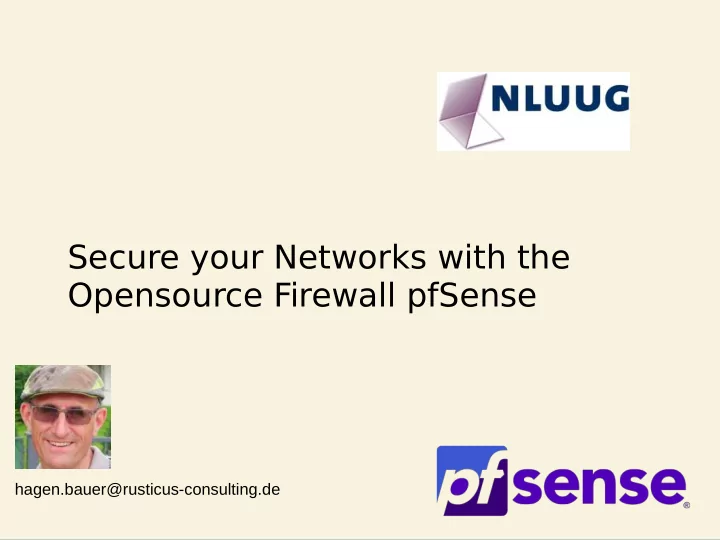

Secure your Networks with the Opensource Firewall pfSense hagen.bauer@rusticus-consulting.de
Agenda ● About me ● Why something new? My provider gave me a fjrewall. ● What exactly is pfSense? ● It’s an easy start ● More complex scenarios are easy to implement ● Summary
About Me ● First job: technical sales for enterprise collaboratjon sofuware ● neither sysadmin nor network engineer ● Power User with “learning by doing” ● pfSense in my home offjce since 2009 – 10 PCs, 4 Server, 8 mobile devices, – Home automatjon, Freifunk, Sonos, Asterisk – 2 Tor Nodes – 4 VLANs – Dual WAN ● netgate authorized partner
Why something new? My provider gave me a fjrewall.
Firewall Market (roughly) ● Enterprise solutjons – $$$$ ● Home use devices – Cheap – Simple but growing set of functjons – Bad track record in regards of security updates
Devices for Home Use ● Missing functjons for small / medium enterprises and family use. – Logging – Site to site connectjons / VPN – Bandwidth limitjng – Network segmentatjon – Multj WAN – Outgoing block of traffjc
LAN local branch your parents Internet DMZ LAN IOT VOIP
So what exactly is pfSense?
pfSense Overview ● Based on FreeBSD – Popular OS plaform for network- and security products – Juniper Junos, NetApp, NetASQ, Cisco IronPort, Citrix, Netglix, etc... ● Administratjon via web interface ● Connects the base components of FreeBSD in one easy to use web user interface ● More functjons then most commercial products
Project History ● Started in 2004 as fork from m0n0wall 1.2 - 02/2008 (FreeBSD 6.2) 2.0 - 09/2011 (FreeBSD 8.1) 2.1 - 09/2013 (FreeBSD 8.3) 2.2 - 01/2015 (FreeBSD 10.1) 2.3 - 04/2016 (FreeBSD 10.3) 2.4 - 10/2017 (FreeBSD 11.1)
Comprehensive Feature Set ● DHCP Server ● Intrusion Detectjon ● DHCP Relay ● PKI ● DNS Resolver ● HA ● Dynamic DNS ● Captjve Portal ● Load Balancer ● Freeradius3 ● Multj WAN ● Squid ● Wake on LAN ● … ● VLAN ● ...
Runs On ● Your own hardware – Min CPU - 500 Mhz RAM - 512 MB ● Appliances from Netgate – Preconfjgured and optjmized – With or without support ● In the cloud – Microsofu Azure / Amazon Cloud ● Hardware requirements depend on throughput and installed packages
It’s an easy start
Scenario 1: Base Installatjon Internet ISP 1 10.17.1.100 Head office 172.17.1.1 LAN 172.17.1.0/24 172.17.1.100
Demonstratjon Base Installatjon
Szenario 1: Base Installatjon Internet ISP 1 10.17.1.100 Head office 172.17.1.1 LAN 172.17.1.0/24 172.17.1.100
Firewall Rules ● Rules are inbound (to the pfSense box) ● First rule wins, the rest will be ignored ● Stateful fjltering ● Aliases simplify the administratjon and reduce possibilitjes of errors – IP addresses – Networks – Hostnames – Ports
More complex scenarios are easy to implement
Advanced Features ● VPN ● DMZ and network segmentatjon ● Bandwidth limitatjon ● Logs of confjguratjon changes
Virtual Private Network ● Connectjon to remote offjces or mobile clients ● IPSec – Standard clients on OS X, iOS, Android – Interoperable ● OpenVPN – Clients behind NAT – Very easy client confjguratjon
LAN 172.18.1.0/24 172.18.1.100 ● Architektur 172.18.1.1 Local branch 10.18.1.100 Internet ISP 1 10.17.1.100 Headquarter 172.17.1.1 LAN 172.17.1.0/24 172.17.1.100
Szenario: Connect 2 Offjces ● Server – Defjnitjon of the VPN server – Open fjrewall for OpenVPN – Defjne network traffjc for VPN tunnel ● Client – Defjnitjon VPN client ● Connectjon test
Demo: Connect 2 Offjces
LAN 172.18.1.0/24 172.18.1.100 ● Architektur 172.18.1.1 Local branch 10.18.1.100 Internet ISP 1 10.17.1.100 Headquarter 172.17.1.1 LAN 172.17.1.0/24 172.17.1.100
Network Segmentatjon ● Base component of network security ● Physical or virtual (VLAN) ● Privat use: IOT, VOIP, „YourChildsLAN” ● Business use: DMZ, old OS in manufacturing facilitjes
LAN 172.18.1.0/24 172.18.1.100 ● Architektur 172.18.1.1 Local branch 10.18.1.100 Internet ISP 1 10.17.1.100 Headquarter 172.17.1.1 DMZ LAN 172.17.2.0/24 172.17.1.0/24 172.17.1.100 172.17.2.10
Szenario 3: DMZ ● Defjnitjon Network / DHCP ● Test Ping – HQ LAN → DMZ => OK – DMZ → HQ Intranet => Error – DMZ → Internet => Error – Branch → DMZ Server => NA ● Port forward to webserver in DMZ ● Test Webserver – Branch → DMZ Server => OK
Demo: DMZ ● Video
LAN 172.18.1.0/24 172.18.1.100 ● Architektur 172.18.1.1 Local branch 10.18.1.100 Internet ISP 1 10.17.1.100 Headquarter 172.17.1.1 DMZ LAN 172.17.2.0/24 172.17.1.0/24 172.17.1.100 172.17.2.10
Scenario 4: Traffjc Shaping ● “Managed unfairness of bandwidth” instead of FIFO ● Queues defjne prioritjes ● Rules manage the queues ● Two methods – Limiter: hard boundary – Traffjc Shaper (ALTQ)
Demo 4: Traffjc Shaping
Confjguratjon History ● Necessary to be GDPR compliant ● Automatjc backup of every change ● “Go back to last version” (save your a**) ● Who did what at what tjme?
Demo: Confjguratjon History
Summary ● Standard device supplied by your provider do not match your growing need. ● pfSense stands out due to – Low / no pre-investments – Enterprise level feature set – Enterprise support if needed – No running license fees of individual capabilitjes (ports / user) ● Ideal start for – Small and medium companies – High end home offjce – Domestjc home
Secure your Networks with the Opensource Firewall pfSense hagen.bauer@rusticus-consulting.de
Recommend
More recommend